Deadly Infections are Killing People. Here are the Symptoms of Strep A and More.

Flu, RSV, Strep A, and COVID are spreading at alarming rates in the US, overwhelming hospitals and even causing a shortage of children’s medicine. “I’ve been doing this for over 20 years now and this fall-winter is like no other. It’s bananas,” says Dr. Shelly Vaziri Flais, assistant professor of pediatrics at Northwestern University Feinberg School of medicine and a spokesperson for the American Academy of Pediatrics. “We have always been fearing that these viruses were going to come back, but then as they came, they came back too fast and too furious,” says Dr. Diego Hijano, an infectious disease specialist with a focus on pediatric infections at St. Jude Children’s Research Hospital. Aside from keeping up with vaccinations, what are the most effective ways to support immune health? We spoke to Dr. Anant Vinjamoori, MD, Chief Medical Officer at longevity company Modern Age. “We have to recognize that the health of our immune system is inextricably tied to how we age,” Dr. Vinjamoori tells Eat This, Not That! Health. “There are two main reasons why. Our immune system function weakens as we age: As we get older, our bone marrow loses its ability to produce T and B cells—which are the key components of the immune system that orchestrate responses. Not only does our immune system become weaker as we get older, but it also becomes more dysfunctional. Specifically, the immune system will begin to activate itself when it shouldn’t, damaging healthy tissue in the process. This process is known as inflammation, and the chronic, slow-burn inflammation that results from the aging process is known as ‘Inflammageing.’ There are a number of ways to get more of these vitamins. While supplements are great if you remember to take them, I find IV Drip therapy and Vitamin D3 injections to be a more effective way of making sure the body absorbs more essential, immune-boosting nutrients faster.” Some experts are also advising a return to mask-wearing in group situations. “Everyone needs to know that masking really does protect individuals against all three viruses,” Dr. Hijano says. “People are really resistant to go back [to mask mandates]. Even if the numbers indicate that it would be beneficial for us, as a community, to all wear masks … I think that it’s going to be very hard, even if recommended, for people to follow.” With so many viruses circulating, it can be difficult to tell them apart, as so many of the symptoms overlap—here are symptoms of strep, flu, RSV, the common cold, and COVID to be aware of. Read on—and to ensure your health and the health of others, don’t miss these Sure Signs You’ve Already Had COVID.
Strep A
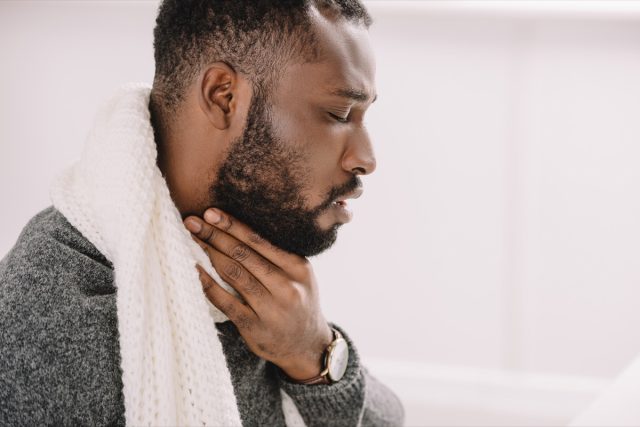
“Very painful sore throat, as well as tender lymph nodes in the neck suggest strep throat,” Dr. Vinjamoori tells us. “The presence of a cough makes strep throat very unlikely.” Do not hesitate to have your child looked at by a doctor if strep is suspected—other symptoms include fever, rash, pain, swelling, nausea, and vomiting. Some experts say two years of lockdowns have exacerbated the situation. “We disrupted our virus transmission,” says Dr Kathryn Moffet, a pediatric infectious disease expert at West Virginia University Medicine. “We did not have the normal [circulation] where you would expect RSV and pneumonia [in young children]. A lot of what we did with social distancing and masks [caused this.” Some children are presenting bizarre symptoms such as lumps behind their ears, eye issues, and drooling. “It could be we have altered patterns of immunity due to the pandemic that may have increased our vulnerability,” says Texas Children’s Hospital pathologist-in-chief James Versalovic. “But it could also be … different variants [of strep]. It could be a combination of factors. No one knows.”
RSV
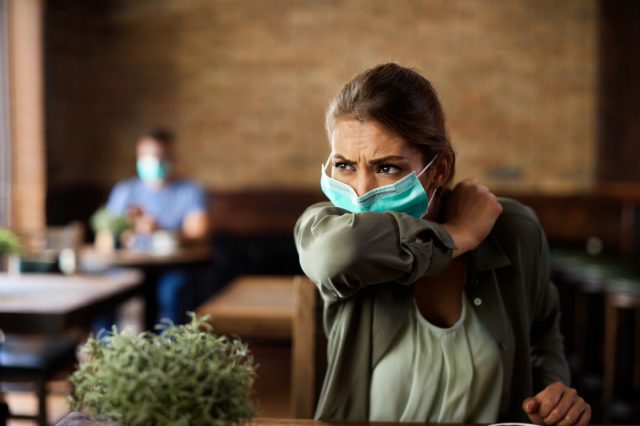
“Cough tends to be more prominent and pronounced with RSV,” Dr. Vinjamoori tells us. “RSV is very commonly acquired in households with small children, so if you have young children, this one might be more likely.” “All the hospitals are just packed right now,” says Jacksonville Clinical Research Director Dr. Michael Koren. “There are waiting times to get into the hospital emergency room. And hospital administrators have been sending out information to all the physicians about trying to get people out of the hospital as quickly as possible. RSV does not have a vaccine, but we are working with that in clinical trials. And that is an interesting virus because we didn’t think it was a real big problem because most people got it when they were young and we thought they were protected during our lifetime, but there are different strains of that virus, and as you get older, you become vulnerable again.”
Flu
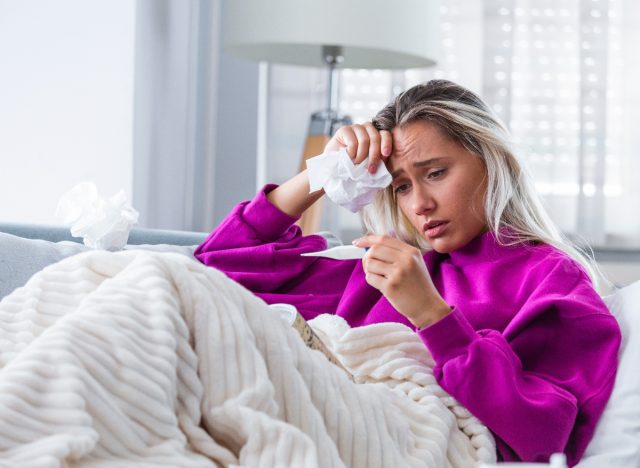
“Fever and muscle aches tend to be the most prominent symptoms of influenza,” Dr. Vinjamoori tells us. Health authorities in the UK are advising people not to mix in large groups if they feel sick. “Both Covid-19 and flu can cause severe illness or even death for those most vulnerable in our communities, and so it is also important to avoid contact with other people if you are unwell in order to stop infections spread over the Christmas and new year period,” Dr Mary Ramsay, UKHSA’s director of public health programmes said. When can we expect flu season to be over? “The optimistic view is that we had an early, severe season, and that hopefully what will happen over the next couple of weeks is that all of the numbers will start going down,” says Dr. Helen Chu, an infectious-disease physician and epidemiologist at the University of Washington. “But the pessimistic view is that this is just the beginning, and then we’ll see a couple of later waves.”
Common Cold
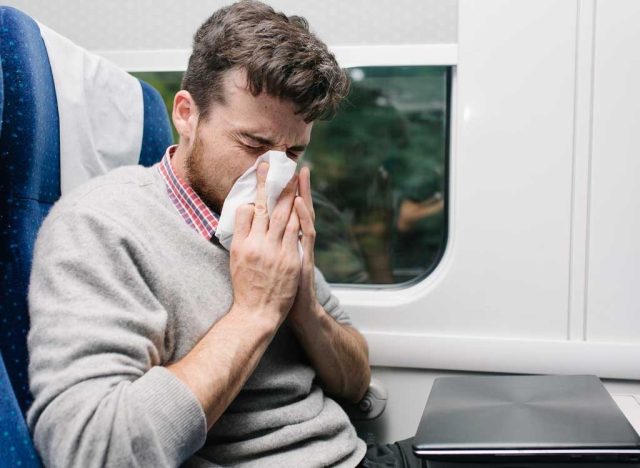
Let’s not forget about the common cold, in the midst of all these dangerous viruses circulating. “Nasal congestion as a dominant symptom suggests a routine cold,” Dr. Vinjamoori says. Does it feel like suddenly everyone you know is sick? You’re not imagining it. “Our immune systems are still working just fine. As we normalize our behaviors again, it takes a while for the patterns to restore into normalcy. All of the viruses have started to come roaring back and in a disrupted pattern,” says Tufts Medical Center’s Dr. Shira Doron. “That’s a consequence of our disrupted human interactions and travel that have thrown everything off. We are all just so susceptible to colds because we didn’t have them for so long. Nobody needs to get a cold to have a normal immune system. You are welcome to try to avoid cold and flu for the rest of your life and it won’t harm you in any way to do that,” she said. “But on a population level, epidemiologically, it’s been disruptive.”
COVID-19

COVID is surging in China, causing great concern about new variants and mutations spreading across the globe. “However way we look at it, it’s very likely that the next few months are going to be quite challenging for China,” says Christopher Murray, director of the Institute for Health Metrics and Evaluation, a global health research institute at the University of Washington. “The populations at greatest risk in the world are those that have avoided a lot of transmission and have gaps in vaccination. And that’s exactly the case for China.” In the US, a “senior wave” is resulting in increased hospitalizations. “Right now we have an immunity wall built up against the Omicron family – between shots and prior infections and combinations thereof – that seems to be keeping younger folks in pretty good stead. But the immune systems of people of advanced age are not as strong,” says Dr. Eric Topol, a physician and professor of molecular medicine at Scripps Research. Topol believes “woefully inadequate” booster rates are contributing to the surge. “It all points to waning immunity. If more seniors had their booster, the effect would be minimal.”
How to Stay Safe Out There
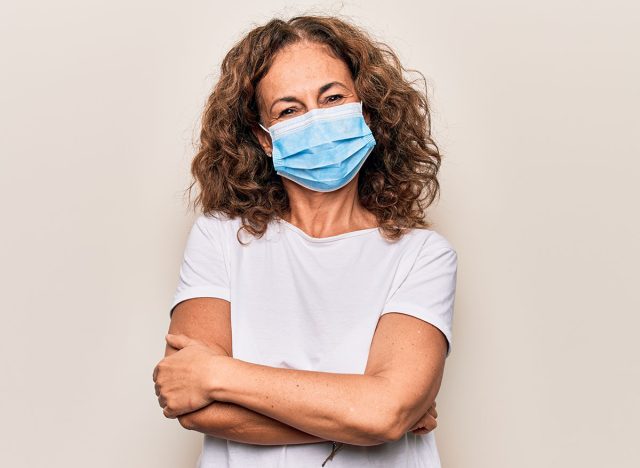
Follow the public health fundamentals and help end this pandemic, no matter where you live—get vaccinated or boosted ASAP; if you live in an area with low vaccination rates, wear an N95 face mask, don’t travel, social distance, avoid large crowds, don’t go indoors with people you’re not sheltering with (especially in bars), practice good hand hygiene, and to protect your life and the lives of others, don’t visit any of these 35 Places You’re Most Likely to Catch COVID.



